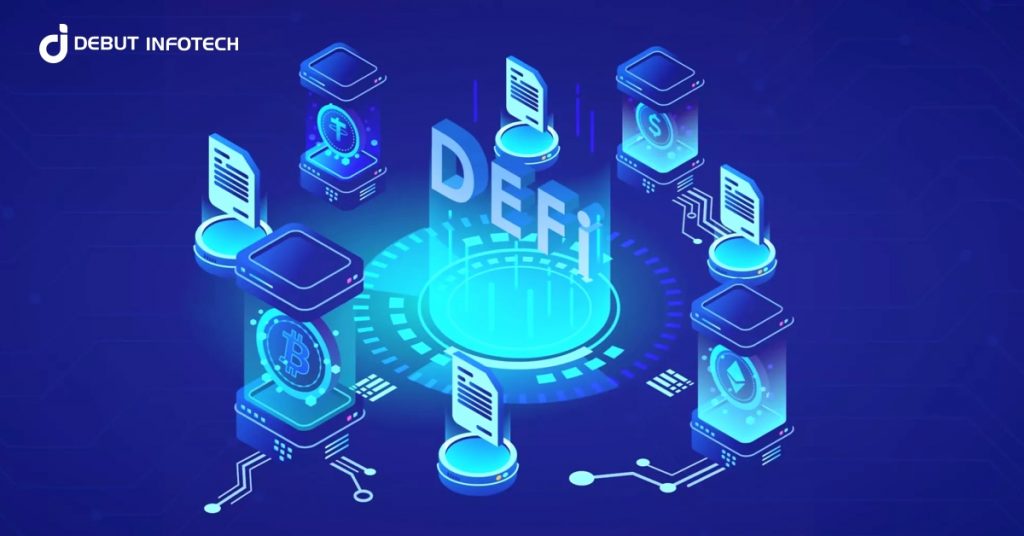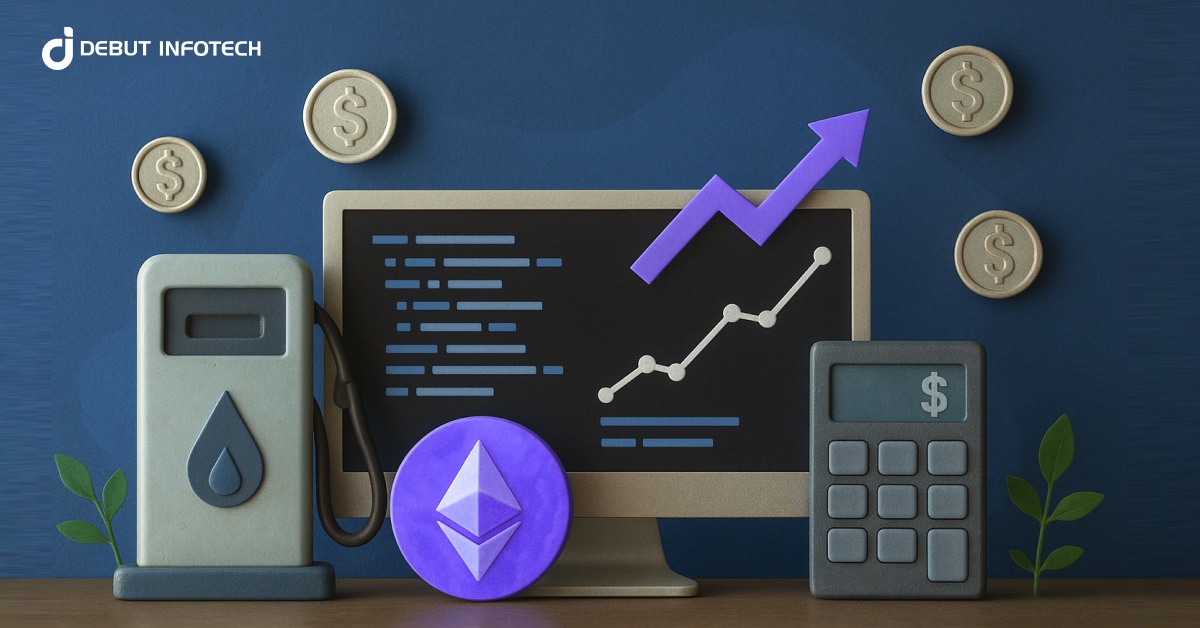
|
Getting your Trinity Audio player ready...
|
The decentralized finance (DeFi) landscape is experiencing explosive growth, with DeFi staking platform development emerging as a cornerstone for user participation and passive income generation.
According to a report by DappRadar, the total value locked (TVL) in DeFi smart contracts surpassed $200 billion in May 2024, signifying the immense potential and user interest within this space. Following this, many businesspersons are looking to capitalize on this trend by allowing users to lock up their crypto assets (stake) to earn rewards. This win-win scenario enhances network security and stability for DeFi protocols while offering investors attractive returns on their holdings.
So, what exactly are DeFi staking platforms, and what benefits do they offer? This comprehensive guide dives deep into the world of DeFi staking platform development, exploring its advantages, various use cases, and the exciting future that lies ahead.
What is Defi Staking Platform?
Many users of centralized staking platforms are curious about what a DeFi staking platform is and how it operates. DeFi staking offers an additional method to earn profits from cryptocurrency assets by utilizing the benefits provided by decentralized finance platforms.
Traditionally, staking within a centralized environment involved authorizing transactions, adding new blocks to the blockchain, and receiving compensation for these activities. In contrast, DeFi staking specifically involves locking cryptocurrency assets in a smart contract to become a validator in a DeFi protocol or a layer 1 blockchain, thereby earning profits for fulfilling these duties.
Broadly speaking, DeFi staking includes any activities that involve temporarily committing crypto assets to a DeFi staking platform. This approach enhances network security and efficiency while often providing higher returns than traditional financial instruments. By engaging in DeFi staking, businesses and investors can generate passive income while contributing to the growth and stability of the decentralized finance ecosystem.
Benefits of DeFi Staking Platforms for Businesses
DeFi staking platforms offer numerous advantages to users, making them an attractive option for earning passive income and participating in the decentralized finance ecosystem.
Here are some key benefits:
- Passive Income Generation: Earn rewards by staking cryptocurrency assets without the need for active trading or intensive management.
- Higher Returns: Competitive yields surpass traditional financial instruments like savings accounts or bonds.
- Decentralized Governance Participation: Stake governance tokens to influence important decisions and ensure user-centric platform evolution.
- Liquidity Provision and Yield Farming: Provide liquidity to decentralized exchanges and earn rewards through transaction fees or new tokens.
- Access to Advanced Financial Products: Utilize innovative products like synthetic assets, decentralized insurance, and DeFi lending protocols.
- Reduced Barriers to Entry: Accessible to anyone with an internet connection and compatible digital wallet, democratizing financial services.
- Flexibility and Control: Easily manage staking strategies and move assets between platforms to optimize returns based on market conditions.
Advanced Use-Cases of DeFi Staking Platforms
DeFi staking encompasses various methods through which users can earn rewards by participating in decentralized finance platforms. These methods cater to different types of users and their specific needs, offering diverse ways to leverage cryptocurrency assets.
- Validator Staking
This type involves staking cryptocurrency to become a validator in a blockchain network, particularly in Proof-of-Stake (PoS) and its variants like Delegated Proof-of-Stake (DPoS) systems. Validators are responsible for maintaining the network by validating transactions and adding new blocks to the blockchain. In return, they earn rewards in the form of additional tokens. Examples include staking ETH in Ethereum 2.0 or DOT in Polkadot.
- Delegated Staking
Delegated staking allows users to delegate their tokens to a trusted validator instead of staking directly. This method is prevalent in networks where not all users want to run a full node. Delegators share the rewards earned by the validators, minus a small fee. This type is seen in networks like Tezos and Cosmos, where users can participate without the technical overhead.
- Liquidity Mining (Yield Farming)
Liquidity mining, or yield farming, involves staking tokens in a DeFi protocol to provide liquidity. Users earn rewards based on the amount of liquidity they contribute. This process often involves depositing tokens into a liquidity pool on decentralized exchanges like Uniswap or SushiSwap. The rewards can be in the form of transaction fees, new tokens, or interest.
- Staking in Lending Protocols
In lending protocols like Aave or Compound, users can stake their assets as collateral to earn interest. These platforms allow users to borrow against their staked assets while earning interest on their deposits. This type of staking provides both liquidity to the platform and passive income to the users.
- Token Staking in Governance
Some DeFi platforms require users to stake tokens to participate in governance. By staking governance tokens, users can vote on important decisions, such as protocol upgrades or changes to the reward distribution. Platforms like MakerDAO and Yearn Finance use this model to decentralize decision-making and incentivize active participation.
- Staking-as-a-Service
Staking-as-a-Service (SaaS) platforms offer professional staking services for users who prefer not to manage the technical aspects of staking themselves. These platforms handle the infrastructure and security, allowing users to stake their tokens easily and earn rewards. Examples include platforms like Staked and Stakefish.
- Insurance Staking
Insurance staking involves users staking their assets to provide coverage for others against potential risks in the DeFi ecosystem, such as smart contract failures or hacks. In return, stakers earn premiums from the policies they support. Platforms like Nexus Mutual and Cover Protocol are examples of this use-case.
- Staking for Synthetic Assets
Users can stake their cryptocurrency to mint synthetic assets, which are digital representations of real-world assets like stocks, commodities, or fiat currencies. This allows users to trade and gain exposure to traditional financial instruments within the DeFi space. DeFi aggregators can assist in optimizing the staking for synthetic assets on platforms like Synthetix.
The Future of DeFi Development
Decentralized Finance (DeFi) has transformed the traditional financial landscape, offering innovative solutions and democratizing access to financial services. As we look ahead, the future of DeFi development promises even greater advancements, driven by technological innovations, regulatory evolutions, and growing user adoption.
1. Interoperability and Cross-Chain Solutions
One of the key future trends in DeFi development is the enhancement of interoperability between different blockchain networks. Cross-chain solutions will enable seamless asset transfers and data exchanges across various blockchain platforms, breaking down silos and fostering a more interconnected DeFi ecosystem. Projects like Polkadot, Cosmos, and Chainlink are already making significant strides in this area, paving the way for a more integrated and efficient DeFi landscape.
2. Scalability Improvements
Scalability remains a critical challenge for DeFi platforms, especially those operating on networks like Ethereum, which can experience congestion and high transaction fees. The future will see continued efforts to improve scalability through Layer 2 solutions, such as rollups and sidechains, as well as the adoption of new consensus mechanisms like sharding. Ethereum 2.0, with its transition to Proof-of-Stake (PoS) and sharding, is a prime example of how scalability enhancements can drive DeFi growth.
3. Enhanced Security and Auditing
Security is paramount in DeFi, given the substantial amounts of value locked in smart contracts. Future developments will focus on enhancing security measures through advanced cryptographic techniques, formal verification of smart contracts, and comprehensive third-party audits. The implementation of decentralized insurance protocols, like Nexus Mutual, will also provide an additional layer of security, offering users protection against potential vulnerabilities and hacks.
4. Regulatory Integration
As DeFi continues to grow, regulatory scrutiny will increase. The future of DeFi development will involve finding a balance between maintaining decentralization and complying with regulatory requirements. Projects will need to integrate Know Your Customer (KYC) and Anti-Money Laundering (AML) measures to ensure compliance without compromising on the core principles of decentralization. Collaboration with regulatory bodies will be crucial in shaping a sustainable and legally compliant DeFi ecosystem.
5. User Experience and Adoption
For DeFi to achieve mainstream adoption, significant improvements in user experience (UX) are necessary. The future will see DeFi platforms becoming more user-friendly, with intuitive interfaces, seamless onboarding processes, and enhanced customer support. Education and awareness initiatives will also play a vital role in driving adoption, as more users become comfortable with the concepts and benefits of DeFi.
6. Integration with Traditional Finance
The line between traditional finance and DeFi will continue to blur, leading to more integrated financial services. Traditional financial institutions are increasingly exploring DeFi technologies to enhance their offerings. The future will likely see hybrid models where traditional financial services leverage DeFi protocols for improved efficiency, transparency, and accessibility. This integration will bring more legitimacy and mainstream acceptance to the DeFi space.
Choosing the Right Blockchain for Your DeFi Staking Platform Development
Selecting the right blockchain for your DeFi platform development involves a meticulous and structured process to ensure the best fit for your project’s unique needs. We begin by thoroughly understanding your platform’s specific requirements, such as transaction volume, security demands, scalability objectives, and user experience goals. This initial step is crucial as it forms the foundation for the entire selection process.
Next, we delve into a comprehensive evaluation of various blockchain options, assessing their compatibility with your project’s technical specifications and desired functionalities. This includes examining the blockchain’s consensus mechanisms, transaction speeds, fee structures, and overall network stability. Our team also considers the maturity of the blockchain’s development ecosystem, the level of community support, and the potential for future upgrades and innovations.
In our evaluation, we focus on several popular blockchains known for their unique strengths in the DeFi space:
- Ethereum: Renowned for its extensive developer ecosystem and robust smart contract capabilities, making it a popular choice for DeFi projects.
- Binance Smart Chain (BSC): Offers lower transaction fees and faster processing times, which are attractive for cost-sensitive applications.
- Solana: Known for its high throughput and minimal latency, making it ideal for DeFi platforms that require rapid transaction processing.
- Polkadot: Provides interoperability, enabling seamless communication between different blockchains and enhancing your platform’s functionality.
By meticulously analyzing these factors, we ensure that the chosen blockchain aligns perfectly with your DeFi project’s goals and technical requirements. Our expert blockchain consultants are here to guide you through this complex process, helping you navigate the ideal blockchain for your business needs and ensuring a successful and efficient DeFi platform development.
Now that you understand the importance of selecting the right blockchain for your DeFi staking platform development, it’s time to take the next step. Partnering with a reliable and experienced DeFi development company is crucial to bring your vision to life. This is where Debut Infotech steps in.
How Can Debut Infotech Assist you Foster DeFi Staking Platform
If you’re ready to embrace the future of finance and incorporate these changes into your app or ideas, the experts at Debut Infotech, a trusted and reliable company specializing in DeFi development services, are here to assist you.
Debut Infotech offers a wide range of decentralized finance development services, including DeFi smart contract development, DeFi token development, DeFi app development, DeFi wallet development, and more.
We take pride in being at the forefront of this financial paradigm shift. Our comprehensive suite of tools and services makes it easy for you to launch and manage your own decentralized finance solutions.
No matter your vision for the future of finance, we can help you bring it to life. Contact us today to learn more about how we can help you create your own DeFi ecosystem.


